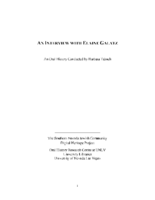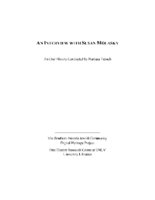Search the Special Collections and Archives Portal
Search Results

Transcript of interview with Henry and Anita Schuster by Claytee White, March-April 2011
Date
Archival Collection
Description
In this oral history, the long married couple Henry and Anita Schuster recall the history of the 1930s and how they eventually met and created a life together. Their childhoods were distinctively different, but charter a future where they would inevitably meet. Born in Germany in 1926, Henry recalls the dawn of Hitler and the Nazism. His mother would arrange for his evacuation to France, where he would not know her fate or that of his two sisters for a number of years. Along with hundreds of other displaced children, he escaped to America and lived with relatives in Louisiana where he finished his schooling and joined the US Army. Anita on the other hand grew up with her family in New York. They share the story of meeting when she was 16, falling in love and marrying in 1948. They had four children and moved several times before settling in California. They retired to Las Vegas in 1993. Henry's recollections include childhood memories of the Holocaust and its affect on his family, including the loss of his mother and one of his sisters. Finding his surviving sister Bertel (Betty Kale) after the war is a heartwarming tale of survival. The Schusters are part of the approximately 300 members of the Holocaust Survivor Group that has settled in southern Nevada and Henry was President Emeritus of the group. He published his memoir, Abraham's Son-the Making of an American, in 2010.
Text

Transcript of interview with Michael S. Mack by Claytee White, May 21, 2009
Date
Archival Collection
Description
During this interview, Michael Mack visualizes his childhood memories of the later 1930s, when Las Vegas was a small, but steadily growing, desert town. As he says, "The desert was our backyard." The Strip hotels like the last Frontier and the Flamingo pop into the stories, but it was basically an innocent time. He attended John S. Park Elementary when classrooms were temporary buildings from the local Air Force base and the neighborhood was filled with children. He still maintains close friendships from that time. And he also recalls friends from the Westside neighborhood. Michael talks of scouting, riding horses, and watching Helldorado parades.
Michael Mack's first recollection of Las Vegas is as a two-year-old living in a duplex on Bonneville Ave. Though the family moved several times, they remained in or near the John S. Park neighborhood. Michael's father was a Polish immigrant who arrived in Boulder City, where he opened a shoe store, in 1932. The building of the Hoover Dam brought opportunities and his father Louis expanded into the salvage business. In time Louis moved the family to Las Vegas, opened a retail clothing store, which eventually sold uniforms, and set up the first local bail bondman office. During this interview, Michael visualizes his childhood memories of the later 1930s, when Las Vegas was a small, but steadily growing, desert town. As he says, "The desert was our backyard." The Strip hotels like the last Frontier and the Flamingo pop into the stories, but it was basically an innocent time. He attended John S. Park Elementary when classrooms were temporary buildings from the local Air Force base and the neighborhood was filled with children. He still maintains close friendships from that time. And he also recalls friends from the Westside neighborhood. Michael talks of scouting, riding horses, and watching Helldorado parades. Though the Macks were a Jewish family, Michael's mother always brought the Christmas tree to school. It was a period when people memorized each other's 3-digit phone numbers, went to movies for 14 cents, and there was a ranch for people to stay while getting divorced. Halloween Trick-or-treaters in the John S. Park neighborhood might get a tasty cupcake or a shiny dime. Michael has a plethora of stories about innocent mischief and the unique experiences of a boy growing up in Las Vegas.
Text

Transcript of interview with Arne Rosencrantz by Claytee White, February 9, 2010
Date
Archival Collection
Description
In this interview, focused on the John S. Park neighborhood of Las Vegas, Arne Rosencrantz discusses his childhood growing up in Las Vegas. He talks about local businesses, including his father's furniture store, as well as schools and churches in the neighborhood.
Arne Rosencrantz remembers living on Beverly Way from 1954 to 1970. Like so many others from that era, he attended Fifth Street School, John S. Park Elementary School, John C. Fremont Middle School and graduated from Las Vegas High School. As a Jew, he was in a small minority, but fondly recalls growing up in the dense Mormon population of John S. Park Neighborhood. As a youngster, life in Las Vegas was filled with fun. The desert provided opportunity to hunt lizards and rabbits. Kids walked to school without concern. They played ball and found the Strip casinos welcoming to locals. He tells how the social issue of segregation of the 1960s did not affect him personally, but how local movie theatre owner Lloyd Katz fought to make his Huntridge and Fremont theatres integrated. He also reminisces about his father opening Hollywood Furniture and later Garrett's Furniture, which Arne operated until retiring in 2001. During the interview, he lists other furniture companies and the strong assortment of other retailers and restaurants that served the neighborhood.
Text

Transcript of interview with Elaine Galatz by Barbara Tabach, April 22, 2015
Date
Archival Collection
Description
Interview with Elaine Galatz by Barbara Tabach on April 22, 2015. In this interview, Galatz talks about growing up in Wisconsin. She attended the University of Wisconsin where she was an English major and active in Hillel and the Sigma Delta Tau sorority. She met her husband, Neil, while traveling through Las Vegas on several occasions, and sparks finally flew when she visited him in Tucson on a whim. She describes Neil's background in law, moving to Las Vegas together, and her job teaching second grade. She describes the small Jewish community in the 1960 including the Katzes, Brookmans, Freys, Molaskys and Greenspuns, and the current direction of the Jewish Federation. Galatz discusses raising her children, some of the cases that Neil worked on, their group of friends, and her love of horses.
Elaine Galatz was raised on a farm outside Madison, Wisconsin. Her father was a Russian immigrant father and her mother a young American born bride. Her father died when she was a teenager and her mother remarried a man who enjoyed gambling and that would lead her to first encounter with Las Vegas. Las Vegas would coincidentally become the center of her life when she and her husband of 51 years, Neil Galatz moved here in 1961. Elaine taught school briefly and worked in Neil's successful law firm for a number of years. Neil was a significant litigator in the MGM fire and PEPCON explosion cases. The couple also shared in the growth of Las Vegas Jewish community. Elaine served as Jewish Federation president, the second woman to hold that office. Among their favorite shared family activities was a love of Morgan horses, which continues to present day for Elaine.
Text

Transcript of interview with Andrew and Debbie Levy by Barbara Tabach, September 12, 2016
Date
Archival Collection
Description
Andrew (Drew) Levy was born and raised in Las Vegas, Nevada, where his family became prominent civic and real estate leaders. His grandfather was Harry Levy, a former Las Vegas City Commissioner, and his father Alvin Levy was a former councilman. Drew is always proud to say that he never left Las Vegas and of partnering with his father in the Levy Realty Company. While growing up, Drew it was easy for a teenager to enjoy the perks that could accompany his family?s civic persona?such as casino shows, events and meeting early Las Vegas casino executives like Moe Dalitz. After graduation from Clark High School, Drew attended Arizona State University. It was in Tempe that he met Debbie Cheek, his future wife. When Debbie arrived in Las Vegas, she enrolled at the University of Nevada, Las Vegas, where she finished her degree and started her accounting practice. She ran her business for ten years before opening Art Starts Here, an art school. In the 1990s, Debbie?s passion for art led her to be involved in the creation of First Friday, a local monthly art festival. She also teaches a summer art camp for the Adelson Educational Campus. Drew and Debbie became deeply involved in the many Jewish congregations in Las Vegas. Blossoming first at Temple Beth Sholom where they were married in 1980, Debbie sat on the preschool board and oversaw the temple board, while Drew was the advisor for the youth group. The couple later joined Congregation Ner Tamid where Drew was congregation president from 1999 to 2000 and Debbie was board treasurer in 2001. Debbie includes stories of her conversion to Judaism and keeping kosher. In this interview, Drew and Debbie Levy reflect on changes they see in Las Vegas, from when Drew was a kid to the times they raised their own daughters, Sarah and Jenna, here. Looking at the larger picture of the city, they describe booms in the real estate market and growth in the artistic and cultural aspects of Las Vegas. They provide a perspective of the growth of the local Jewish community.
Text

Transcript of interview with Hershel Brooks by Barbara Tabach, December 8, 2016
Date
Archival Collection
Description
Hershel Brooks was born December 3, 1930 in Brooklyn, New York. He was raised in an orthodox Jewish household, along with his four siblings, and attended Jewish community schools before pursuing his rabbinical studies. He studied at TelsheYeshiva in Cleveland, Torah Vodaath in New York, and Jewish Theological Seminary in New York. Before assuming his first rabbinical position, Brooks married his wife, Alma, and graduated with his BA from the University of Miami. He was first hired by a conservative congregation in Miami, and subsequently led congregations in Savannah, Georgia, Greensboro, North Carolina and Philadelphia, Pennsylvania. Eventually, he joined a temple in Anaheim, California, where he served for twenty years. In 1996, Brooks retired to Las Vegas. He was soon asked to lead services at Temple Bet Knesset Bamidbar [BKB] twice a month as its rabbi. He still is active at BKB, though he retired in 2011. In this interview, Brooks reflects on his family background and the path that lead to his becoming a rabbi in the Conservative Jewish Movement. He talks about his career, including his involvement with BKB as well as other Jewish community service, including facilitating adult bar mitzvah classes and serving on the local Rabbinical court of Judaism, known as Bet Din.
Text

Transcript of interview with Agnes Gauger by Coleen Mancini, February 24, 1977
Date
Archival Collection
Description
On February 24, 1977, Coleen Mancini interviewed the claims manager for the Culinary Workers and Bartenders Insurance Fund, Agnes Gauger (born Coleen Evans on November 21, 1926 in Arkansas) in her home in Las Vegas, Nevada. Mrs. Gauger’s daughter, Traci Sturdivant was also present during the interview. This interview covers significant changes and growth in Southern Nevada, including gambling and other industries, family life and recreation, and early atomic tests. Mrs. Gauger also discusses housing in the Las Vegas, Howard Hughes, McCarran Airport, medical facilities and education in Southern Nevada.
Text

Transcript of interview with Rowena Gonzalez by Michael Boyd, March 1, 1977
Date
Archival Collection
Description
On March 1, 1977, Michael Boyd interviewed Rowena Gonzalez (born 1946 in Wichita Falls, Texas) about her life in Nevada. Gonzalez first talks about her family background and residential history before discussing the way of life in Texas and eventually in Las Vegas. Several topics covered in the interview include Gonzalez’s recollections of the atomic testing, the building of the Hoover Dam, and Howard Hughes. The two also discuss tourism, the properties on the Strip and in Downtown Las Vegas, and early means of transportation.
Text

Transcript of interview with John Grayson by Elizabeth Patrick, May 23, 1983
Date
Archival Collection
Description
On May 23, 1983, collector Elizabeth N. Patrick interviewed gaming professional John Grayson (born May 25, 1898 in Grayson, Missouri) at the University of Nevada, Las Vegas. The interview covers John Grayson’s experience with gaming in Arizona, California, and Nevada. Also present during John Grayson’s interview is Billy H. Gray, a longtime gaming associate of his, who helps Mr. Grayson go into greater detail about key events.
Text

